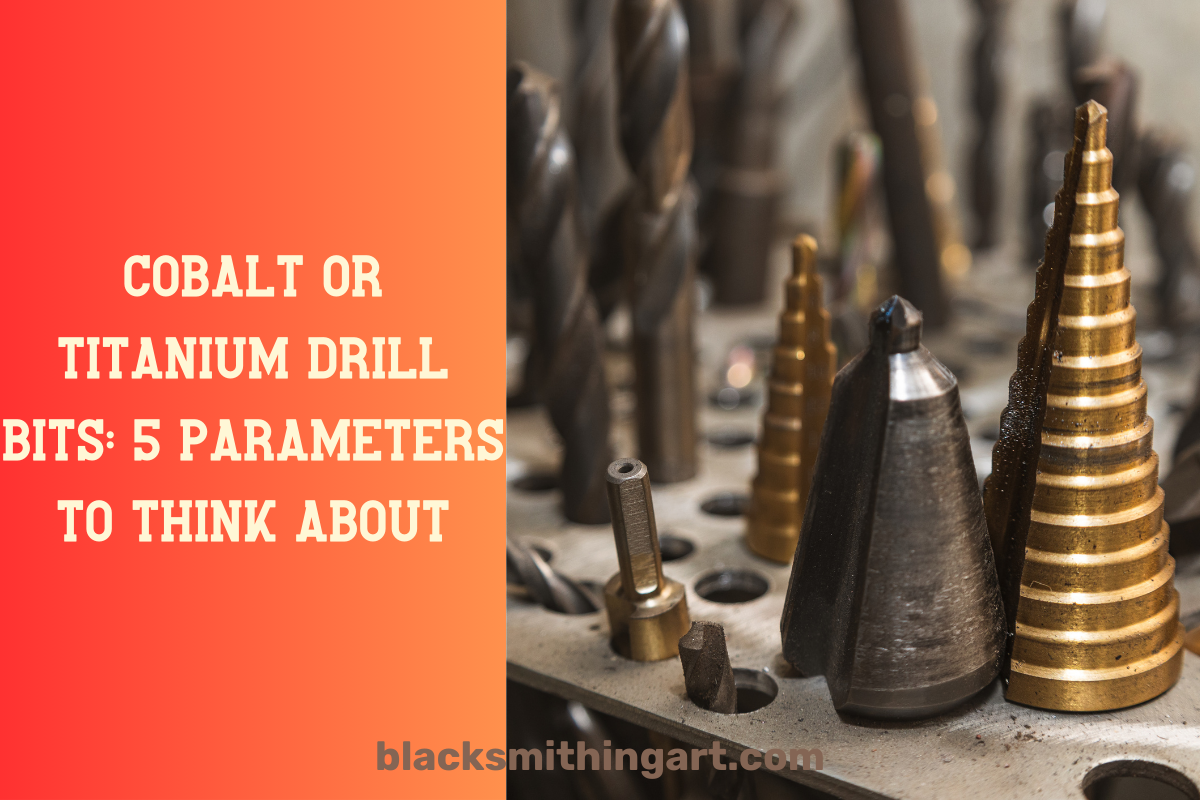
Knowing the intricacies of the cobalt vs titanium drill bits is fundamental to optimizing metal drilling efficiency and achieving superior results across woodworking. Understanding your material preferences will guide you toward picking the best suiting drill bit.
Contents
Overview: Cobalt vs Titanium Bits
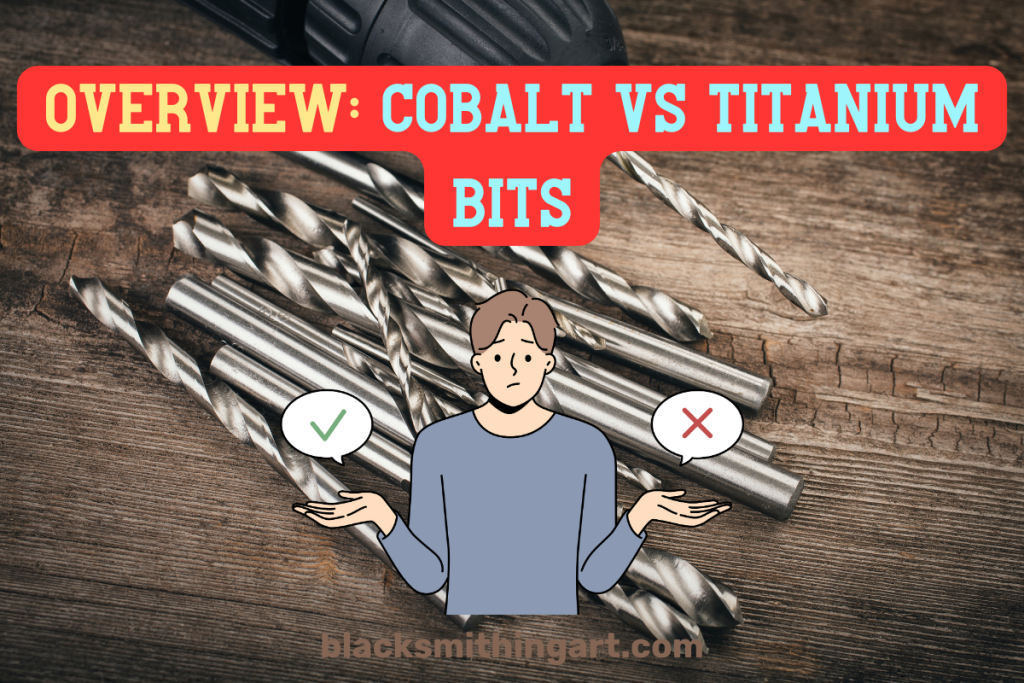
In metal drilling tasks, drill bits are the first decision you need to make. Among multiple tools available, two materials are the most prominent: titanium vs cobalt drill bits.
Titanium vs cobalt drill bits are often chosen to drill holes in hard metals. The inherent qualities of cobalt and titanium make them indispensable. We delve into the cobalt and titanium drill bits, uncovering their attributes.
Their specialized coatings (like black oxide) not only signify reliability but also ensure superior performance. These qualities encompass tackling hard materials with precision.
Cobalt drill bits are enriched with black oxide for endurance. This not only fortifies but also ensures longevity, making them resilient in high-temperature drilling scenarios and ideal for challenging tasks.
Titanium drill bits are also protected with titanium nitride and black oxide. The inclusion of titanium nitride further amplifies the drill bit’s resilience, fortifying its surface against wear and heat, thereby extending its lifespan and performance. The titanium bit might also feature titanium aluminum nitride for increased toughness.
They are crucial components of any toolbox, offering an unparalleled blend of durability, precision, and versatility. Their presence ensures readiness for a myriad of jobs, including robust metal surfaces to delicately maneuvering through softer materials.
As indispensable components, they embody the reliability and efficiency required for a diverse range of projects, making them a staple in any craftsman’s or professional’s arsenal.
First: Look into the Compositions of Drill Bits
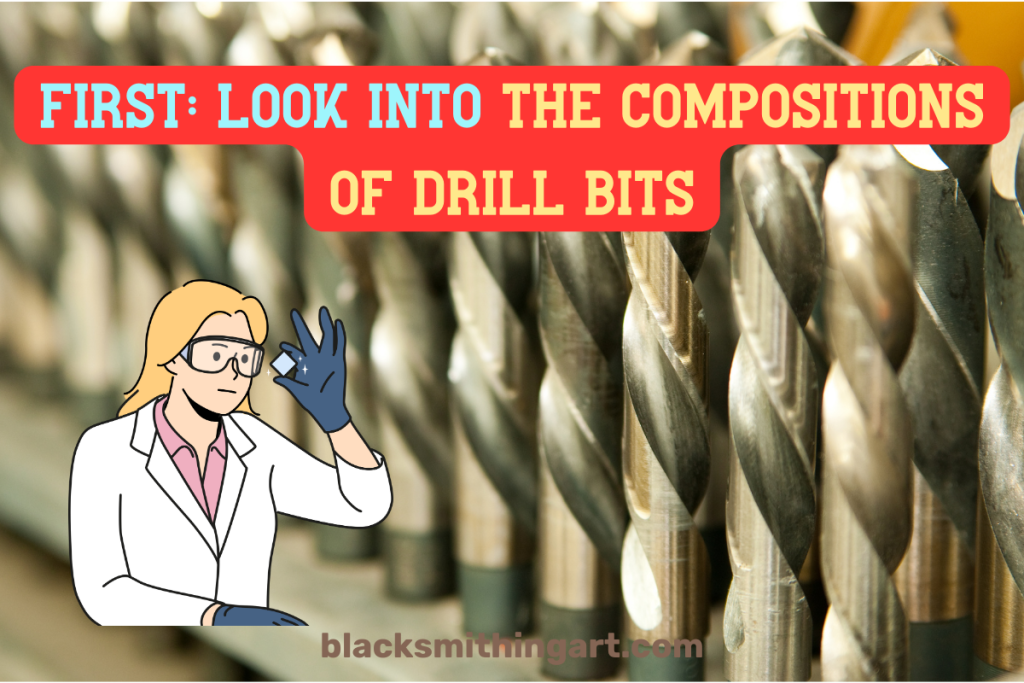
Diving into the world of drill bits, we’re dissecting the offerings of titanium vs cobalt drill bits. We aim to specify the situations where each of the two drill bit options should be used. I’ll spill the beans on when to pick each, so your next project not only rocks but drills like a pro. Grab your toolkit, we’re about to begin.
Cobalt Drill Bits
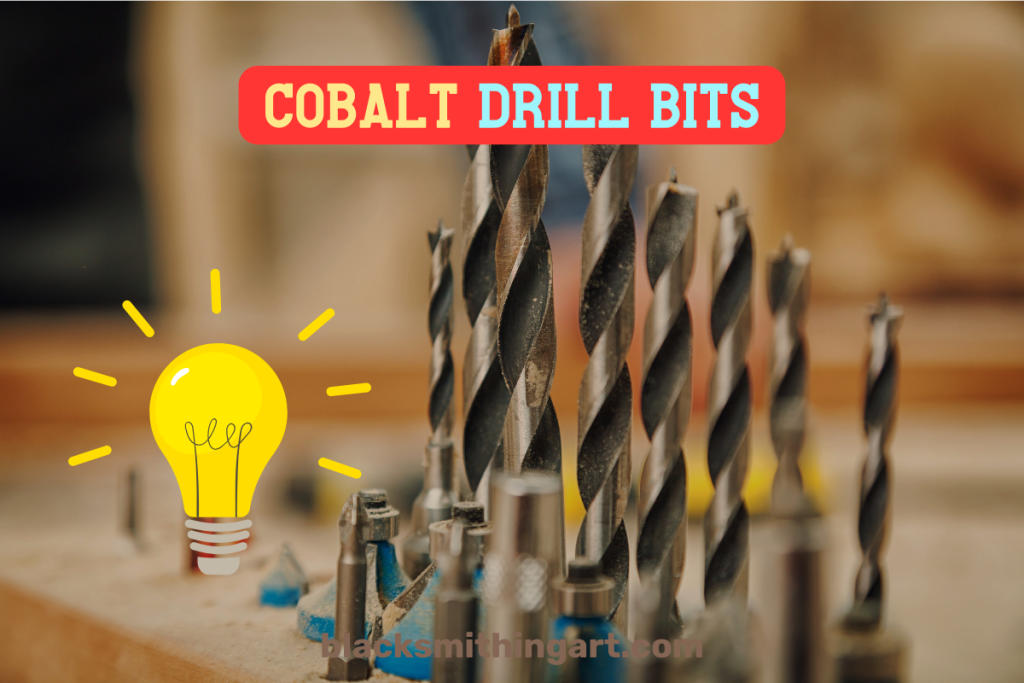
Cobalt drill bits use black oxide to impart robustness and high-temperature endurance. Black oxide is integral for cobalt drill bits to function in higher temperatures.
It is vital for continuous functionality, establishing cobalt drill bits as a top pick for industrial jobs involving intense drilling conditions, such as metal fabrication, where enduring high temperatures is crucial for consistent precision and reliability.
Typically, they contain a blend of cobalt, making them suitable for even cast iron, especially when paired with a power drill.
Cobalt drill bits combine steel in precise proportions. This fusion results in a cobalt drill bit that maintains sharp cuts.
This enduring edge resilience is particularly invaluable when confronted with high-speed perforation, guaranteeing to sustain its cutting efficiency and precision across prolonged periods of use, maintaining superior performance and reliability throughout diverse applications.
All listed attributes allow cobalt drill bits to endure use without compromising structural integrity, rendering them unrivaled to simpler drill bits.
Titanium Drill Bits
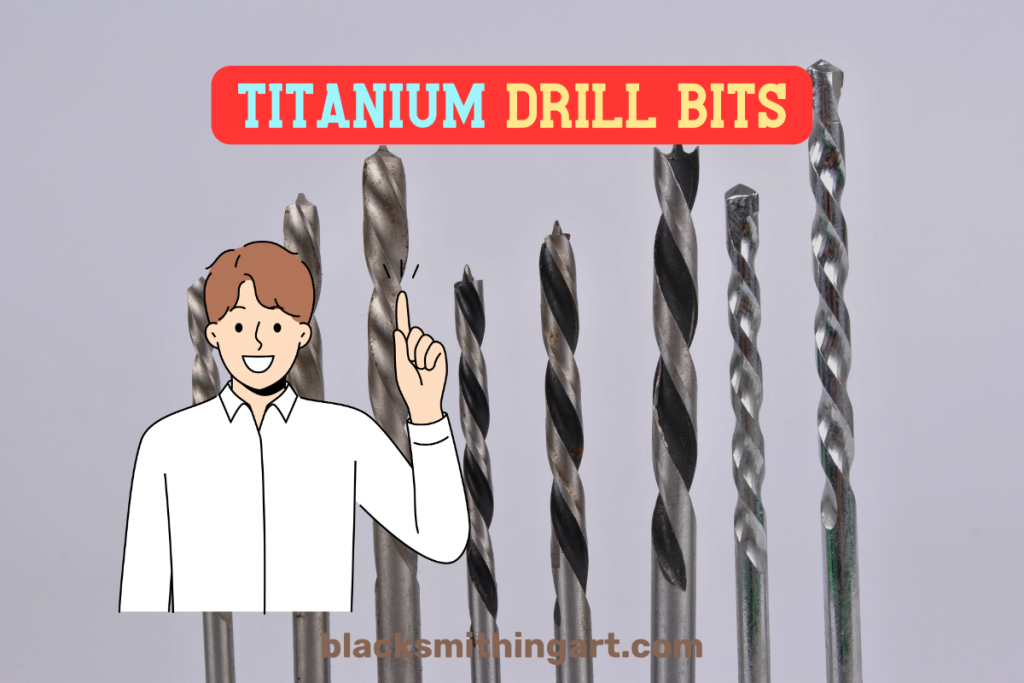
Titanium drill bits include a layer of black oxide and titanium nitride applied via a vapor deposition process. Titanium drill bits protected with black oxide show distinct qualities and a prolonged lifetime. Titanium nitride also enhances the tip of the drill bit.
Titanium drill bits typically contain high-speed steel. The fusion offers lightweight properties, so the drill bits are supreme for mild steel.
The drill bit is exceptional at maintaining a sharp edge. Specialized titanium drill bits leverage coatings (titanium aluminum nitride, for example) on top of titanium coating.
Furthermore, their user-friendly nature makes them an excellent choice for DIY enthusiasts. Their lightweight design minimizes fatigue during prolonged use, allowing for extended sessions without compromising performance.
So, for your next project involving less hard materials, it might just be your trusty companion, providing both longevity and precision.
The Endurance of the Cobalt Drill Bit and Titanium Drill Bits
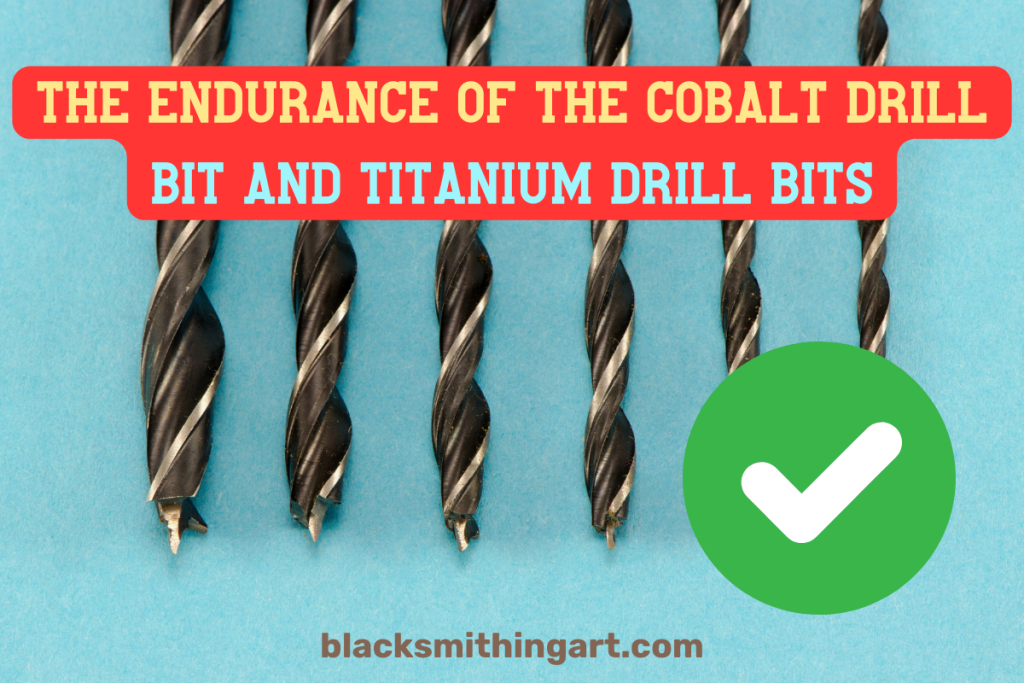
Cobalt drill bits, thanks to their robustness and black oxide addition, excel even when overheated. The cobalt drill bit exhibits remarkable durability against abrasion.
Cobalt drill bits outperform when dealing with tough materials, unlike titanium drill bits. The exceptional and lasting resilience makes it a go-to for challenging materials, offering precision and longevity.
The titanium drill bit maintains a sharper edge, it’s a valuable choice when friction is limited. Titanium drill bits, with their layers of black oxide or titanium nitride, display resilience in soft formations.
Perhaps you’re crafting a delicate project from aluminum or working on a piece where finesse is key. Here it will be your go-to maestro with the ability to maintain a surgical maneuver rather than a brute force operation.
Picking cobalt drill bits and titanium drill bits is linked to your current goal. Evaluate your project when looking at titanium vs cobalt drill bits.
Second: Reliability of Cobalt and Titanium Drill Bits
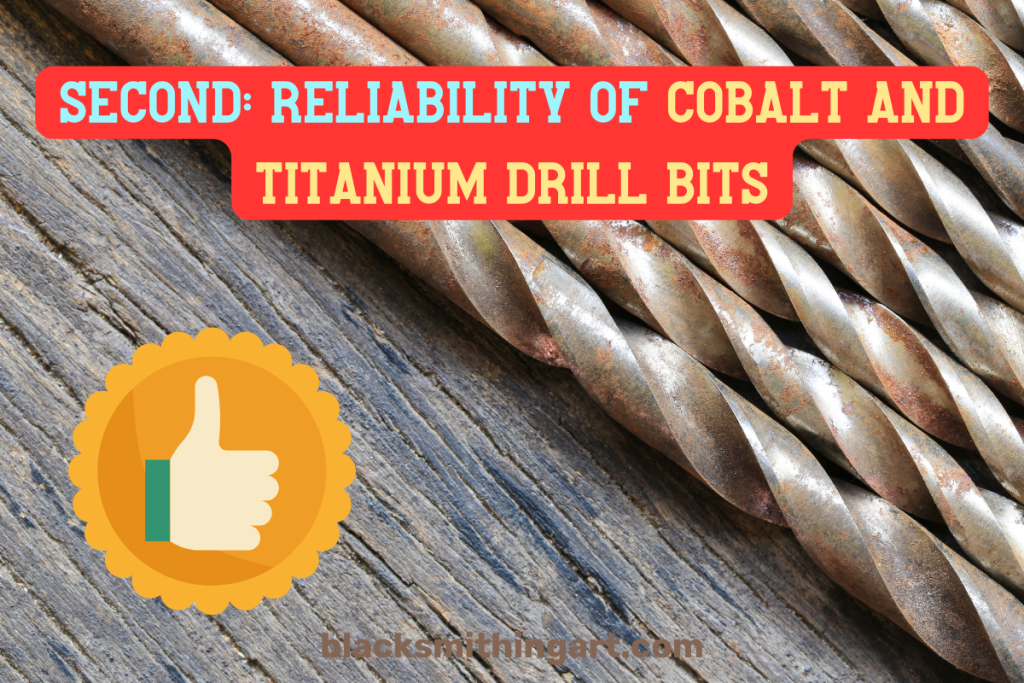
The preference between cobalt drill bits and titanium-coated drill bits hinges on your working circumstances. Cobalt drill bits excel under high heat and tackle challenging surfaces. Their rivals, titanium drill bits, provide reliability across a multitude of jobs.
High Heat and Cobalt Drill Bits
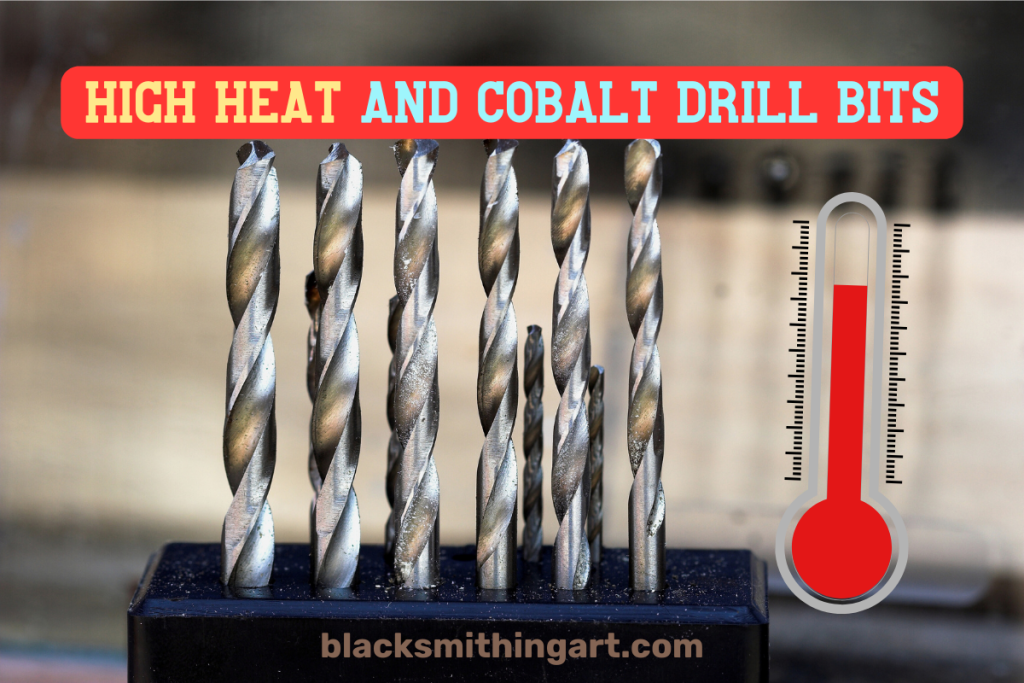
Cobalt drill bits preserve their structural integrity even when subjected to elevated temperatures. This resilience to high heat guarantees the consistency and reliability of cobalt drill bits in industrial settings.
Cobalt drill bits are great for harder compounds, especially when paired with a power drill. The inherent properties enable cobalt drill bits to endure extensive overwork without compromising their cutting efficiency.
Picture this: you’re in the midst of a demanding project, navigating through tough compounds that seem to challenge every twist and turn.
That’s when this tool steps up to the plate, proving to be the ultimate sidekick that can keep their cool, quite literally.
Titanium Drill Bits Across Varied Jobs

Titanium drill bits excel in ranging work environments. Whether working with treated stainless steel or other surfaces, titanium drill bits are remarkably accurate.
Titanium-coated drill bits combining high-speed steel, display the necessary strength and lightweight properties. In scenarios where finesse is the key, titanium drill bits stay sharp and minimize wandering or slipping.
Whether you’re delicately working on detailed woodworking projects or tackling intricate metal surfaces, consistent accuracy becomes your reliable companion across a spectrum of jobs, ensuring each task is met with precision and efficiency.
Metrics of the Cobalt Drill Bit and Titanium Drill Bit
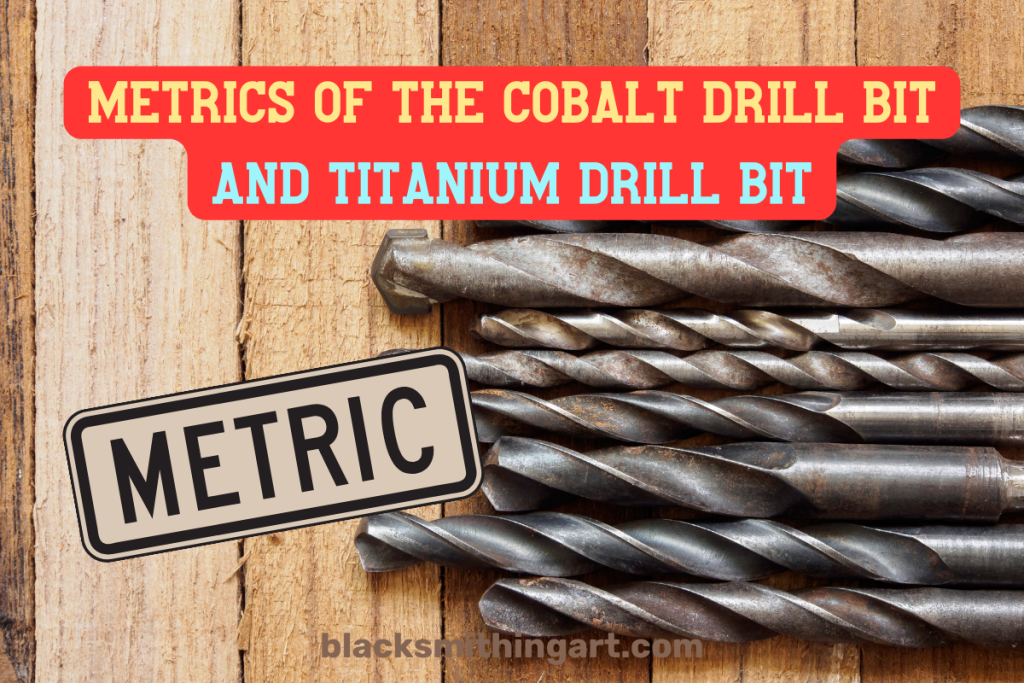
A lot of parameters are important when evaluating the metrics of cobalt drill bits and titanium drill bits.
Cobalt drill bits excel in high heat, positioning them as indispensable tools. Their robustness and endurance in high-heat environments contribute to reliable performance and extended longevity, especially in industrial settings. Designed for toughness, they might feature a split-point design for better self-centering, ideal for hard materials.
On the other hand, titanium drill bits may leverage a standard 118-degree point angle, emphasizing versatility across different materials.
Titanium bits are reliable in ranging environments and offer an upper hand in tasks requiring accuracy and finesse. Their ability to maintain sharpness and provide consistent performance in various scenarios makes them valuable for tasks oriented on precision.
Note that cobalt and titanium drill bits can be refined with a bench grinder.
Additional elements, such as tin coating on top of cobalt and titanium coatings, can play a part in augmenting the use of cobalt drill bits or titanium bits. Tin coating, while not as common as cobalt and titanium coatings, is occasionally applied to cobalt drill bits or titanium bits.
Third: Drill Bit for Your Task
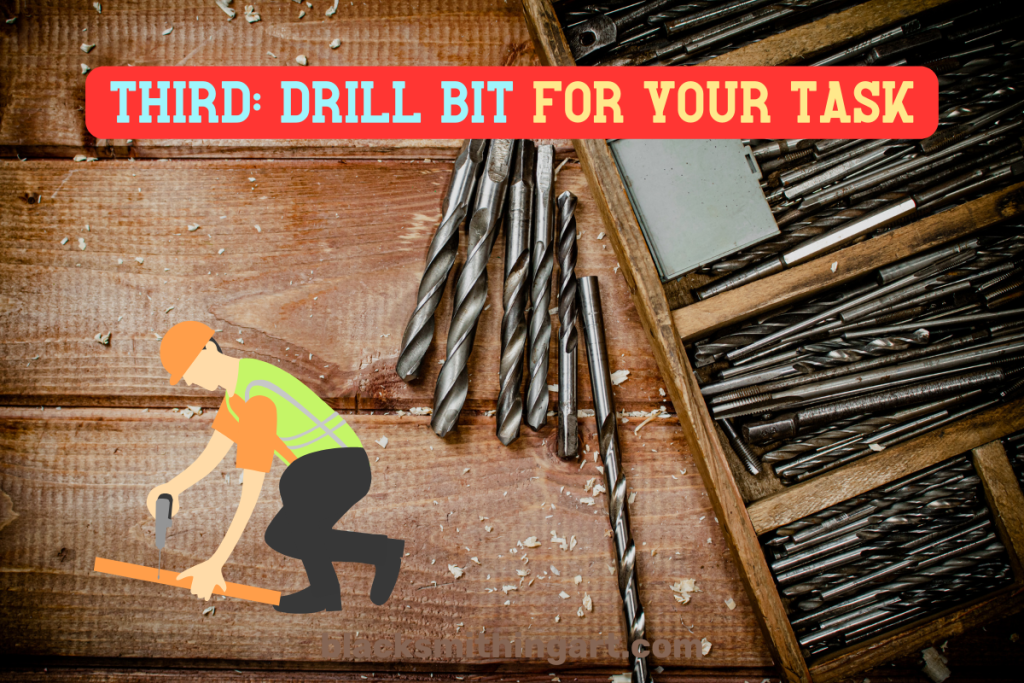
Understanding the task-specific qualities of cobalt drill bits and titanium drill bits lets you choose based on the nature of the material and the desired outcome.
Cobalt Drill Bits: Dominance in Sturdiness
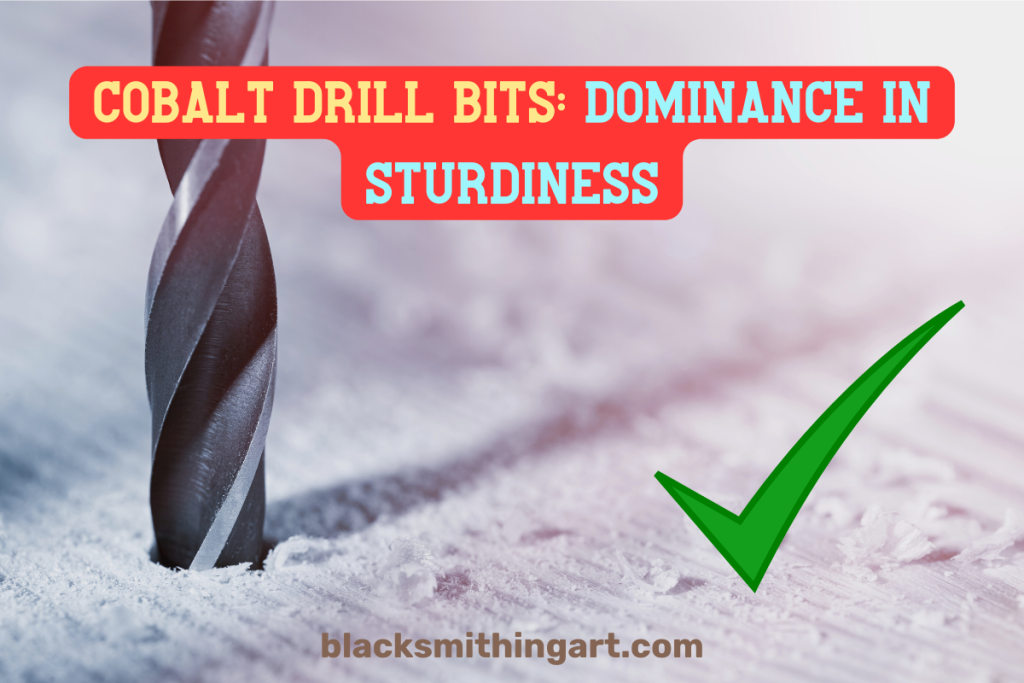
The cobalt drill bit asserts its dominance with strong materials. Cobalt drill bits exhibit unparalleled durability, allowing them to tackle even something like cast iron effortlessly.
The robust construction of the cobalt drill bit enables it to withstand without compromising on lifespan or effectiveness.
Their capacity to maintain cutting edges and endure the abrasiveness positions cobalt drill bits as the first pick for heavy-duty jobs where resilience is critical.
Titanium Drill Bits: Accurate in Softness
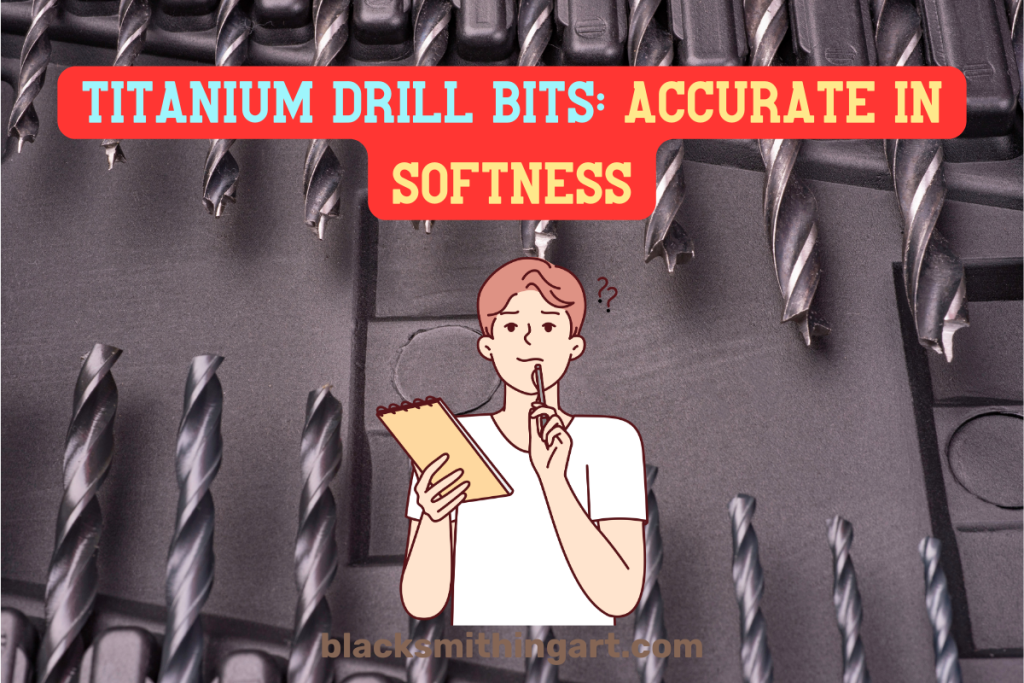
Titanium drill bits, in contrast to cobalt bits, excel when dealing with soft materials. Protected with titanium nitride or comprising alloys, they provide exceptional finesse.
Titanium bits’ ability to maintain sharp edges and minimize material distortion during drilling ensures cleaner, more accurate holes. This precision becomes particularly advantageous in woodworking, crafting, or any project that demands intricate detailing.
Guidance on Job-Specific Drill Bit Selection

Getting the right drill bits based on the surface being worked on is crucial for achieving optimal results.
For cast iron and other hard materials cobalt drill bits are perfect for their robustness, ensuring consistent performance.
Conversely, when precision in soft materials is required, titanium drill bits become the top candidate. Their precision-maintained cutting edges and ability to minimize material distortion make them ideal for projects where accuracy and finesse are paramount.
When tackling high-heat conditions during your drilling tasks, it’s worth considering the use of high-speed steel bits for optimal performance and durability.
Fourth: Drill Bit Price and Value Considerations

The decision-making process involves evaluating upfront costs against long-term benefits to determine which type of bit offers the best return on investment for the intended drilling tasks.
Each type presents a different balance between initial expense and extended utility, enabling users to select the most suitable option based on their project requirements.
Cobalt Drill Bits: Value
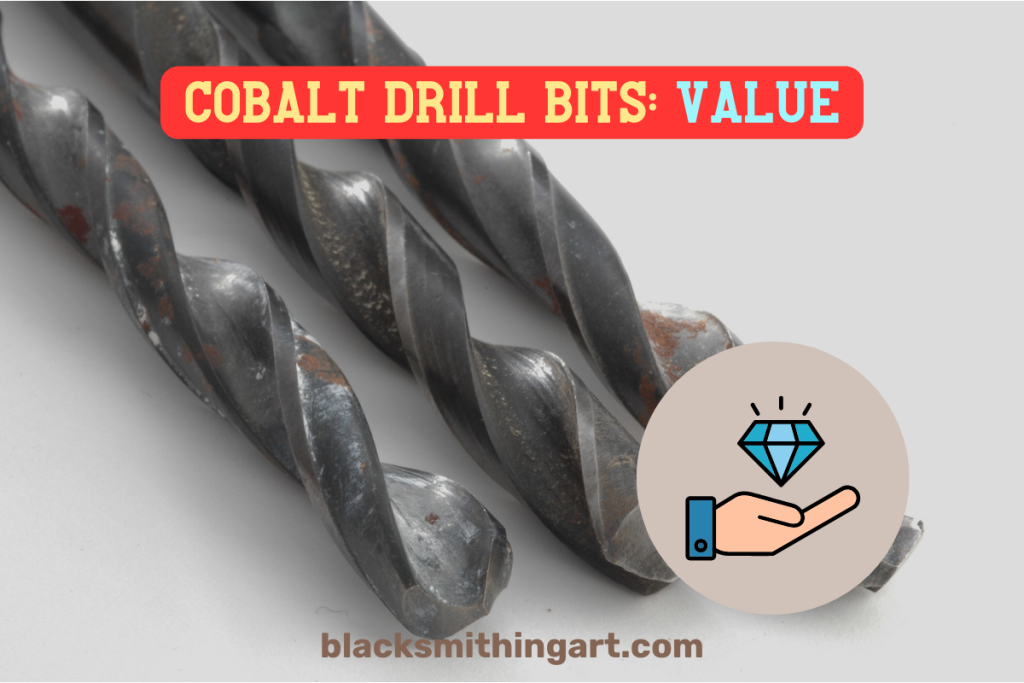
Choose cobalt drill bits for a long-term value. Initially, the cost of cobalt bits might be slightly higher than standard bits, but their endurance against hard materials like high-speed steel or steel alloys promises extended utility.
The longevity of cobalt bits minimizes the frequency of replacements, thereby reducing overall expenses over time. The ability of cobalt bits to withstand hard materials positions them as reliable tools for heavy-duty applications, ensuring consistent performance without compromising on quality.
Titanium Drill Bits: Premium Features and Cost-Benefit Analysis

Titanium drill bits are synonymous with premium features. Despite their potentially higher upfront price, these bits bring a multitude of advantages to the table.
They exhibit precision in softer materials and a commendable resistance to corrosion, making them ideal for applications involving softer metal alloys.
Their ability to retain sharpness over time further contributes to their overall value, compensating for the initial investment.
While they may have a higher entry cost, their long-term performance and specialized capabilities make them a valuable addition to any toolkit.
Which Drill Bit Offers the Best Return on Investment?

The ultimate value proposition between titanium and cobalt bits depends on specific applications and durability needs.
Cobalt bits are durable against hard materials, offering extended usage and reduced replacement frequency.
On the other hand, titanium bits, with their precision and resistance features, promise longevity and specialized performance.
Fifth: Comfort and Ease of Use

Ultimately, the dispute between cobalt bits and titanium depends on striking the right balance between handling comfort and precision control, aligning with the user’s preferences and requirements.
Cobalt Drill Bits: Comfort in Handling

The ergonomic design of drill bits significantly impacts comfort during handling.
Cobalt drill bits often boast a design that enhances grip and handling comfort.
The increased sturdiness of these bits ensures a secure grip, allowing users to work confidently, especially when dealing with high-speed steel or materials that demand a steady hand.
Their ergonomic features aid in reducing fatigue during prolonged use, promoting a comfortable experience.
Titanium Drill Bits Insights
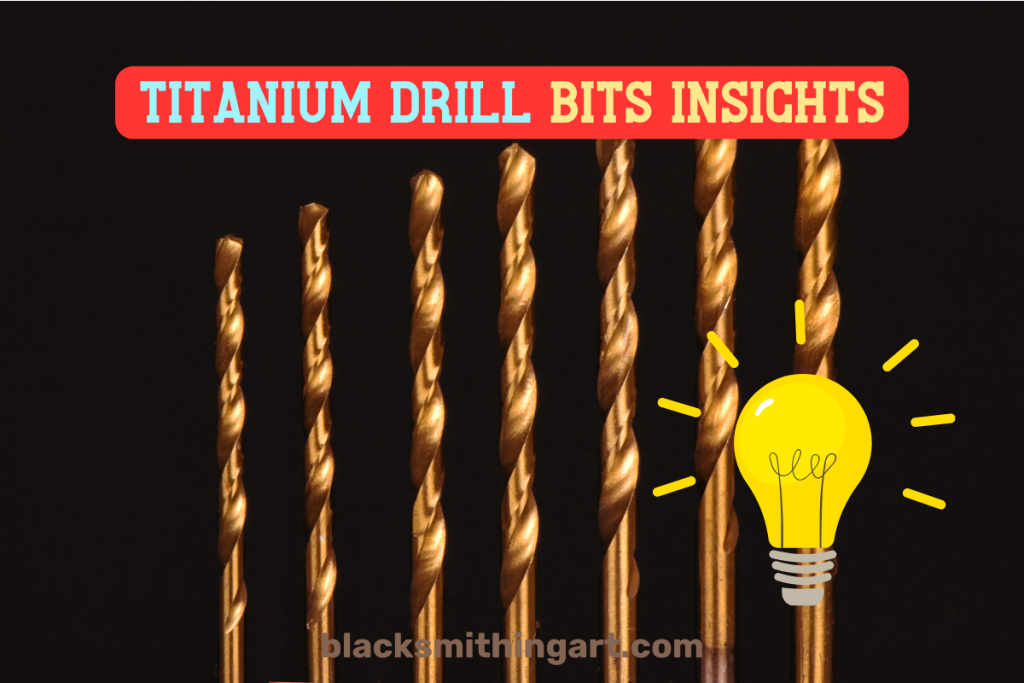
Titanium drill bits, recognized for their finesse, provide users with enhanced control. Their cutting edges enable smoother perforation through various surfaces.
This precision facilitates cleaner and more accurate holes, particularly in soft metals, resulting in an overall smoother user experience with minimized chances of slippage or errors.
The inclusion of titanium nitride in titanium drill bits provides notable improvements, including heightened corrosion resistance and prolonged bit lifespan. The same goes for the black oxide layer.
Comparative User Feedback: Cobalt vs. Titanium
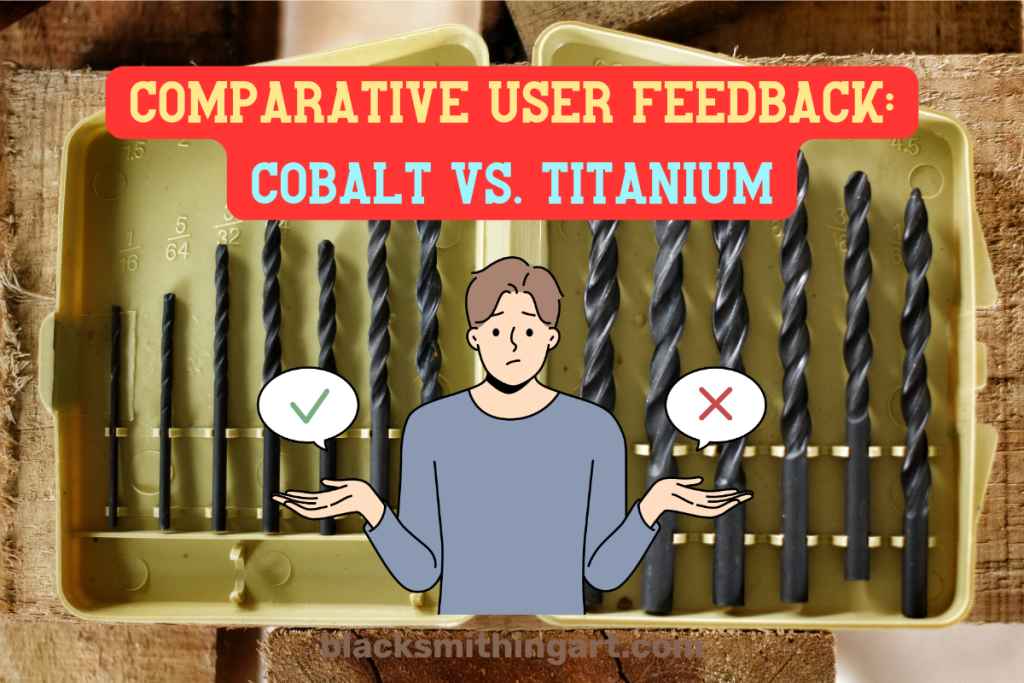
User feedback serves as a valuable source of insights when comparing cobalt and titanium drill bits. Cobalt bits receive praise for their ergonomic design and grip comfort.
Titanium bits are lauded for their precision and ease of use, especially in delicate drilling scenarios. The comparative feedback underscores the importance of considering both ergonomic comfort and control.
Here’s a comparative table:
| Features | Titanium Drill Bits | Cobalt Drill Bits |
| Material | Titanium alloys or coated HSS | Cobalt alloys or coated HSS |
| Heat Resistance | Up to 1,500°F (Approximate) | Excellent, handles high temps around 1,500°F |
| Wear Resistance | Moderate to High | High |
| Uses | Softer materials, woodworking | Hard materials, metal drilling |
| Price (Approximate) | Moderately Priced, $10 to $50 or more, depending on the size and set | Higher than standard bits, $20 to $100 or more, depending on the size and set |
You can also read about a spade bit in my previous article.
FAQ
Which drill bits are better cobalt or titanium?
Cobalt and titanium drill bits possess strong qualities, enhanced with black oxide.
Cobalt bits offer exceptional strength and endurance, they’re good for abrasive materials like steel alloy.
The benefits of titanium bits are precision and coating, providing smoother experiences.
The decision hinges on the particular material and the specific demands of the project.
What is the advantage of cobalt drill bits?
Choose cobalt drill bits for tougher metals (cast iron, hardened steel, or steel alloy). Their advantage lies in their robustness, making them durable and ideal in high tem[temperatures without compromising performance, especially if covered in black oxide.
What are the disadvantages of cobalt drill bits?
Cobalt drill bits show exceptional endurance but they might be less suitable for softer compounds because of their robust nature. Cobalt drill bits can be relatively pricey.
What is the advantage of titanium drill bits?
Titanium drill bits, protected with titanium nitride, provide precision and a smoother experience. The advantage of these drill bits lies in the titanium coating that enhances the cutting edge, providing cleaner cuts. Titanium nitride elevates their strength.
Takeaways for Each Drill Bits
Cobalt or titanium drill bit? Cobalt and titanium drill bits each excel in their lane.
Cobalt shines in cost-efficiency, and titanium-coated bits outperform in versatility.
Cobalt bits dominate tougher materials like high-speed steel and robust alloys thanks to black oxide coating.
Meanwhile, titanium-coated bits demonstrate precision, ensuring clean and accurate drilling holes in softer alloys, ideal for jobs where finesse is paramount.
Cobalt and titanium drill bits signify innovation, empowering enthusiasts to craft, build, and engineer with finesse.
Cobalt and titanium drill bits are indispensable for a spectrum of your needs. As this exploration into drill bits concludes, the focus remains on selecting the right tool for the specific material and project at hand.

